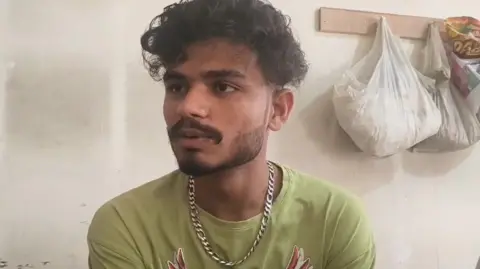Kamal Saini,BBC Punjabi, Kaithal, Haryana and
Avtar Singh,BBC Punjabi, Kaithal, Haryana
 Kamal Saini
Kamal SainiSeveral illegal Indian migrant workers who were recently deported from the US have recounted their ordeal to BBC Punjabi, describing humiliation, debt and shattered dreams.
At least 54 men, who had entered the US through the “donkey route” – often used by traffickers to facilitate illegal crossings – landed in the country’s capital Delhi on Sunday.
Aged between 25 and 40 years, all of them are from the northern state of Haryana and have since returned home, police said. The Indian government has not commented on their deportation.
But the action comes amid an intense crackdown on illegal immigrants under President Donald Trump’s administration, with more than 2,400 Indians sent back from the US just this year.
Several men, especially from South Asian countries, undertake arduous journeys to go to the US and Europe via the so-called “donkey route”, also called the “dunki route”, which involves crossing through multiple borders.
Many sell land and take loans to fund their journeys in search of a better life, or to support their families back home.
Of the 54 deportees who returned on Sunday, BBC Punjabi met 15 men in Haryana’s Kaithal district who say they are now uncertain about their future.
Harjinder Singh, a farmer who had spent 3.5m rupees (£29,653; $39,624) to go to the US four years ago, said he worked there as a cook – a job he took so that he could support his children back home.
“My hopes have been dashed, it is a pity that I could not do anything,” said Mr Singh, adding he cannot forget the humiliation he was put through during the deportation process.
With all his savings gone, he is worried about his children’s future.
Another deportee, Naresh Kumar, said he had sold land and paid 5.7 million rupees to agents who promised to get him to the US.
He left for Brazil in January 2024, from where he travelled to the US. “My relatives kept giving me money from time to time while I was on the way,” Mr Kumar said.
But before he could start a new life there, Mr Kumar was arrested for illegally entering the country. “I spent 14 months in jail and then they sent me to India.”
BBC Punjabi has reached out to the US Immigration and Customs Enforcement (ICE) for comment.
 Kamal Saini
Kamal SainiMeanwhile, Rajat Pal from Karnal district who reached the US via Panama, described his journey as “very dangerous”.
He left his home in May 2024 and managed to reach his destination only several months later in December, he said.
It is unclear how he travelled, but many people using such routes have to take multiple modes of transport, from buses to boats, and make treacherous treks through jungles as they are smuggled from point to point.
A senior police official in Kaithal said none of the deported men had filed formal complaints against the agents who arranged these journeys, but “action will be taken once a complaint is received”.
The Indian government has previously said continuous efforts to raise awareness on safe and legal migration were being taken, with Prime Minister Narendra Modi flagging the issue of young, vulnerable Indians being fooled into immigration lured by big dreams and promises.
According to India’s foreign ministry, some 2,417 Indians were deported from the US between January and September 2025.
Earlier this year, the deportation of 73-year-old Harjit Kaur, who had lived in the US for three decades sparked anger among the Sikh community in the US.
In February, more than 100 Indian citizens were sent back on a US military aircraft. One of the deportees had told the BBC they had been handcuffed throughout the 40-hour flight, sparking criticism.
But deportation flights to India had been taking place for several years and US procedures allowed for the use of restraints, Indian Foreign Minister S Jaishankar said, following the uproar.
As of 2022, an estimated 725,000 undocumented Indian immigrants were in the US, making them the third-largest group after those from Mexico and El Salvador, according to data from the Pew Research Center.
Follow BBC News India on Instagram, YouTube, Twitter and Facebook.



